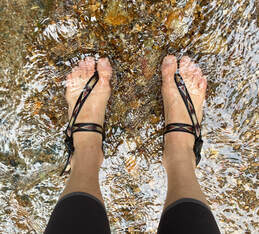 The author on a recent hike The author on a recent hike (By Grace Rollins, MS, LAc) As I write this it's the last day of April, but I only just learned this month is considered National Foot Health Awareness Month. Well, there are a few hours left in the month so it's not too late to draw attention to the importance of foot health. Why do foot issues impact us so much? First off, they impact our mobility. If your foot hurts, it can be really hard to exercise or do the daily walking we know is vital for our health. Since so much about our health depends upon physical activity, a foot injury or repetitive strain can create snowball effects. Secondly, the health of our feet impacts our entire musculoskeletal system. The key word here is system. Our bones, joints and muscles work together in a coordinated fashion, and no one part is separate from the movement and functioning of the whole. In particular, the way we use the many joints and muscles of our feet (or the way we don't use them) has ramifications all the way up your anatomy chains. Your feet alone have 33 joints, 26 bones, and more than a hundred muscles, tendons and ligaments. Why would nature design us with so many tiny joints and muscles in the foot? If you guessed to serve as an active, intelligent interface between the body and the terrain, you win! (The prize is a barefoot walk across the yard.) When such a complex structure loses mobility, strength, sensory input, tissue integrity, or becomes inhibited by pain and deformity, it changes the way we interact with the terrain and impacts the body from toe to head. A third reason foot health impacts us so much is that feet are sensitive, yo!
0 Comments
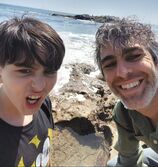 (By Paolo Propato, LAc) My son likes to call the body the “meat suit” that just takes cues from the brain, helping it get from point A to point B. Instead, I like to think of the body as the most highly sophisticated antenna in existence, transmitting and receiving all types of information that connects us to the world. Our unconscious mind listens to this all the time, but sometimes we need to fine-tune the conscious mind to listen better. For instance, take the very ground you walk on. Whether you are walking on soft moss, asphalt, tiles, pebbles… these all have a different effect on your joint angles and motor function, your vestibular sense, even your emotions. The body even senses electron exchange with the earth, if we permit it to have direct contact through our skin to conductive surfaces like soil and water. The sound and vibration of our foot falls, the temperature of the ground, the pain or pleasure of certain pressures and stretches on the foot, different types of footwear… it’s a never-ending exchange of information with your entire body, if you tune in and listen, and your body can learn and adapt from this information. I was told by one of my acupuncture teachers that in Japan, stroke patients are sometimes told to walk barefoot on a rocky beach as part of their rehabilitation. To take another example: our emotional environment. Our very thoughts affect the functioning of the body, and just think of all the things that influence our thoughts on a daily basis! 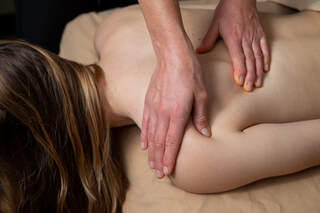 (By Brian Yang and Grace Rollins, LAc) Since I’ve been working lately with several cases of shoulder pain I thought I would offer some insights into how we approach common shoulder problems as acupuncturists. The shoulder allows for many of the movements that we use an everyday basis, and has an incredibly broad range of motion compared to other major joints-– something that allows a healthy shoulder to hang, reach, climb and throw with ease. Some of the incredible mobility of the shoulder comes from the shallowness of the ball-and-socket portion (the glenohumeral joint), and the fact that it has three other joints in addition to that ball-and-socket: the sternoclavicular joint (where your collar bone meets the breast bone), the scapulothoracic joint (where your shoulder blade glides close to the ribcage), and the acromioclavicular joint (where your shoulderblade meets your collarbone). In other words, the shoulder joint is actually four joints! Similarly, the “rotator cuff” (or “rotator cup” as some are fond of saying) is not just one muscle but four (supraspinatus, infraspinatus, teres minor, and subscapularis)-- forming a “cuff” that helps “rotate” your upper arm in all different dimensions. In addition to your rotator cuff muscles, we could mention several muscles involved in scapular movement, upper and lower arm movements, and the relational movements between the neck and shoulder, not to mention muscles that impact the brachial plexus (innervation to the shoulder). Shout-out to the lats, biceps, triceps, pecs, scalenes, levator scapula, serratus, and don’t forget everyone’s favorites, the upper trapezius and rhomboids! With such a complex “joint” there are many types of pathologies that can cause pain and loss of range of motion in the shoulder: tendonitis, tendinopathy and degeneration, arthritis, adhesive capuslitis (“frozen shoulder”), bursitis, impingement, fracture, radiculopathy, neurovascular compression, dislocation and more. Due to the complexity of the shoulder it’s helpful to narrow in on the origin of pain. 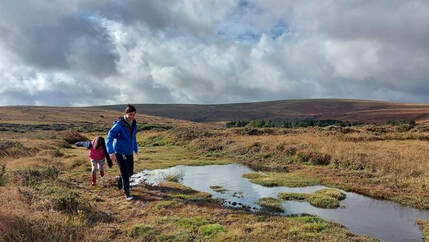 (By Grace Rollins, MS, LAc) It's worthwhile to contemplate why some individuals get sicker than others. Let's intentionally set any kind of judgmental attitude-- toward others or one's self-- aside for the sake of exploration. How much we do to take care of our health, and "how well," is always relative. My own personal day-to-day health maintenance practices are as imperfect as those of my self 20 and 30 years ago. However, each day I am making my best effort to advance my knowledge, discipline and efforts, while also practicing self-compassion. That being said, we do have a great deal of power over our health through our personal actions. How to generate health states is something our mainstream culture perhaps surrenders too much. Instead we often focus on the "bad luck" aspects of genetics, trauma or infectious disease. Do some healthy people get a difficult case of COVID due to simple genetics or bad luck? Possibly, we truly don't know at this point. But there are some things we do know. On average, COVID (and many other "bad luck" diseases) tend to hit people harder who don't exercise, who are overweight and who have weakened immune systems, all factors that usually relate to one's overall state of health. It's therefore highly likely that other aspects of health cultivation (how much we sleep, how much stress we suffer, the condition of our microbiome, our nutritional status, etc.) also relate. 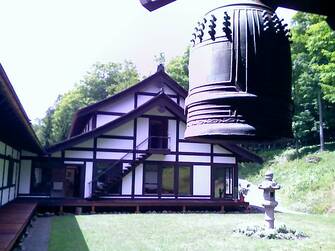 Dai Bosatsu Zendo in upstate NY Dai Bosatsu Zendo in upstate NY (By Grace Rollins, MS, LAc) I've practiced Zen for close to 20 years. Though the primary practice is seated meditation (Zazen), there is a lot more to it, even for a layperson like me. In the past I've traveled several times to a Zen monastery for special week-long formal trainings known as Sesshin. There I would practice Zazen, walking meditation, chanting, formal meals, strict etiquette, and cleaning. Yes, cleaning. I was actually fond of the twice-daily cleaning periods during Sesshin because it let me move my body out of the sitting position I was in for so many hours of the day. Probably because I was among the younger and fitter, the monks usually assigned me to floor cleaning duty. In the common Japanese way this involved mopping the floor by hand using a zokin (cleaning rag). To clean the long monastery hallways I'd run in a crouch, pushing the zokin out in front of me in the traditional fashion. The faster, the better-- it was invigorating, and if I'll be honest my martial arts buddies and I were probably showing off to see who could finish their floor section first. Plus, if I finished my chores early, I could have a longer break before the next sit! One evening I was cleaning the tile stairs that led up to the old head priest's quarters when I saw him coming up the stairs. I respectfully stepped aside but to my surprise he took the zokin right out of my hand and demonstrated how to properly clean the corners of the stairwell. In my haste I was being too sloppy, apparently, and he saw me missing the corners. "Clean even where no one can see it," he said to me. 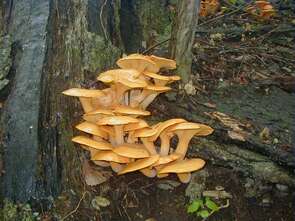 (By Paolo Propato, LAc) The other day Issa (my son) and I found a plethora of mushrooms in the woods. We both got very excited. “Issa, I’m not sure but I think these are Chanterelles!” Our eyes lit up like we had happened upon a hidden treasure. In my mind all I could see were plates full of mushrooms... there was enough for Mamma, Grace, Faye and the rest of the crew (we picked a lot of mushrooms). As I looked at them sitting on the kitchen table I remembered Grace once had an experience of mistaken identity with chanterelles. A quick google and message to Grace with a picture, and the verdict quickly came in, they were not chanterelles but Jack O’lanterns. Very similar in appearance except Jack O’lanterns can cause GI distress. Of course I got rid of them, but it left an impression on me because they looked so good! As I threw out the mushrooms a thought came to me: Do I think I’m a Chanterelle but am really a Jack O’ lantern, or vice versa? Have I convinced myself that I am one way but in reality I am something else? 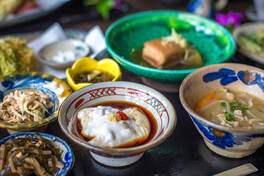 (By Paolo Propato, LAc and Grace Rollins, LAc) The late summer weeks are associated in Eastern Medicine with the Earth element and the Spleen and Stomach energetic systems. These systems are a Yin-Yang pair and govern all aspects of digestion and assimilation. Even other organs obviously related to digestion, like the bowels and the gallbladder, are secondary to the importance of the Spleen and Stomach. In the 5-element system so central to Chinese medicine practice, the Earth energy is like the gravitational force that holds everything else together. So if the Spleen and Stomach energies are out of balance, many other systems can become compromised. As we transition from the slower pace of summer back to the rushed life of full-time work and school, it's good to take a look at how it's not just what we eat, but the manner in which we eat that can drastically affect the health of the Spleen and Stomach, having ramifications throughout the body. 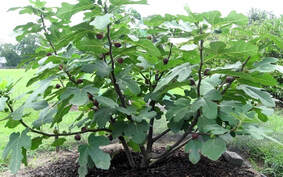 (By Paolo Propato, L.Ac.) “Our attitude towards life counts more than our ancestry.” I can’t remember who told me this but it has always stuck. Many patients attribute their health issues with genetics, whether rheumatoid arthritis, IBS, migraines... the list goes on. This attribution relinquishes not only responsibility but in a way, hope. At any rate it is probably premature in most cases. If you take the seed of a healthy plant and place it in a harsh environment it may survive, but not thrive. The better the environmental quality, the more that life or Qi can expand outwardly. In healthy soil with appropriate light and water, the plant will be able to blossom, attracting bees and butterflies. When I was growing up, many times I saw my grandfather replant a tree or bush that someone else had pulled out and discarded due to its appearing unhealthy. With gradual nurturing it would again flourish. (And later he would sell it!) In this day and age, surrounded by so many toxins we can't control, it’s especially important that we do our best to give ourselves a healthy soil to thrive in. A few years back I went to the Horsham township meeting over the concern of water contamination with perfluorooctanioc acid (PFOA) and perfluorooctane sulonate (PFOS) from the Air Force base. The room was packed like sardines with people from various townships venting their concerns. 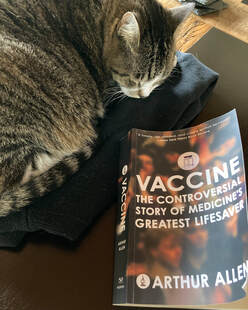 (By Grace Rollins, MS, LAc) This spring I’ve been having conversations just about every day with patients, friends and family about the COVID vaccines. Whether to get one, safety concerns, which one is better, even which arm to get the shot in. My studies of biochemistry and immunology only went so far, and I’m not qualified to offer specific advice on the subject, I tell people again and again. However, I do have some observations that may be helpful based on the way I see everyone grasping for answers. Personally, I put a lot of thought into getting one of the COVID vaccines (which I did back in February). After all, they are brand-new, super-expedited, and let’s be honest, still quasi-experimental. Under normal circumstances I wouldn’t have felt compelled to get the jab until it had undergone a bit more testing. Trying to keep an open mind, I read the entire tomb of Vaccine: The Controversial Story of Medicine’s Greatest Lifesaver over the winter. 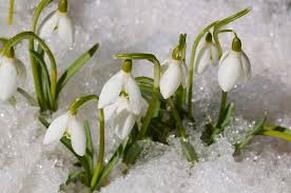 (By Paolo Propato, LAC) The past is the earth from which the future grows. My own experience of the past year began with our acupuncture clinic closing, and suddenly spending time at home with an uncertain future. The first week was driven by fear, with the neighbors leaving bags of groceries outside their houses to decontaminate. We were constantly on the phone with family and friends in Iran and Italy to get updates, knowing we were only a week or two behind. After a few weeks into lockdown, almost every neighbor was jogging or walking outside, and we all spoke from the other side of the street. The news reports gripped us with anxiety, but we would also laugh as we pulled weeds from the flower beds behind our townhome community. I learned to substitute holding hands with only a look from a distance, and grieved with those that had lost loved ones or had been overwhelmed by fear of the unknown. 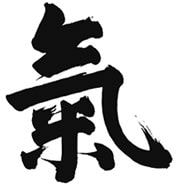 Paolo Propato, L.Ac. and Grace Rollins, L.Ac., licensed acupuncturists at Bridge Acupuncture in Doylestown, PA, sit down to discuss the energetics of acupuncture and what it is like to work and train in their field of medicine. Paolo: Acupuncture is said to be a medicine that harmonizes “Qi” (“Chi” or “Ki”). Can you describe Qi from your experience as a practitioner? Grace: Many people think of Qi as “energy,” but I think that’s too materialistic of a translation. It’s interesting that one of the many direct translations of the character for “Qi” is "weather," if you add the symbol for “heaven” just before it. In other words, the Qi of the heavens is weather. So to me, Qi is basically a very useful term that sums up certain complex processes that together, create recognizable phenomena in the body. If you try to think of Qi as some kind of literal substance or force you’re just going to frustrate people interested in an anatomical corollary, because you won’t find a measurable “energy” that corresponds to what people who practice Asian medicine and martial arts are talking about. So how would you describe weather? It’s electromagnetic and gravitational relationships between elements and molecules; it's also the interaction of all those molecules with a wide spectrum of solar and celestial radiation, as well as with the gravitational and electromagnetic fields of the earth and moon. On top of that it’s the outcome of complex pressure systems, thermodynamics, fluid dynamics, so many chaotic processes, all overlapping and influencing each other. And even with all this complexity, we can study it, characterize it, make tenuous predictions about it. “Qi” for acupuncturists is like “weather” as it relates to the body. And the same way that we recognize many patterns and phenomena in weather, we learn how to recognize patterns in Qi as acupuncturists, which aids us in influencing the functions of the body to promote health. P: What do acupuncture methods actually do? 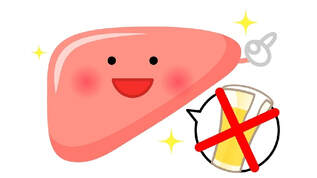 (By Grace Rollins, MS, LAc) Around the New Year is when many of our patients start to talk about “detoxing” in order to get their health back on track. It seems like a natural inclination, especially if the holidays encouraged a freer intake of sugars, pastries and alcohol. However, as a practitioner I feel the use of expensive kits, concoctions and "crash cleanses" are a bit overrated. First of all, what does "detoxing" actually mean? By using its famous enzymes to catalyze changes in other molecules, the liver breaks apart or transforms chemicals, hormones and metabolic byproducts into a form that can be excreted via the GI tract or kidneys. This is why you are wide awake when you first have that cup of coffee, but a few hours later it "wears off"-- the caffeine molecules have been gradually disassembled by your liver and eliminated. Our daily exposure to high levels of chemicals is a rather recent phenomenon in history. Just think about the following sources our pre-20th century ancestors were never exposed to: From Patient to Practitioner, and small lessons along the way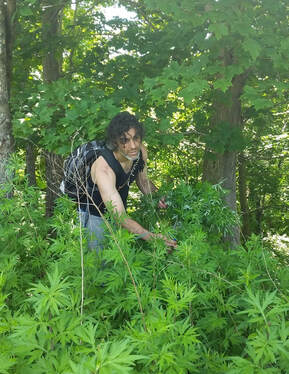 (By Paolo Propato, LAc) Having suffered from life-long sinus issues, I found myself at age 24 sitting in a dark room in Florence, Italy as a heavy set man with a big mustache burned moxa cones. The room filled with the strange smell of mugwort smoke. My thought was, “I am paying this guy to help with my sinuses and he is making smoke.” After the session he was smiling and said, “I can help you. It may take some time and you have to do some dietary changes but I can help you.” I still don’t know why I made another appointment, but in the end it saved me from my doctor's push for surgery. Fast forward to a few years later in Bucks County, when I found myself calling every acupuncturist in the tri-state area asking if I could hang out in their office. As fate would have it the only one kind enough to invite me in was close to home. Grace let me observe and eventually took me on as her assistant as I began to attend three years of grad school in northern New Jersey for acupuncture. The nights studying, long car rides to school, odd jobs for extra cash-- although tiring and stressful, there was never a moment I thought of stopping. All I wanted was to go deeper into this medicine. The more I stood by Grace's side and watched patients heal, the more I was fueled to keep going. The smell of moxa, so strange years ago, had infused into my cells. Healing and becoming a healer, with acupuncture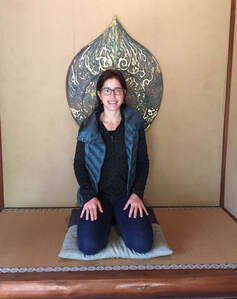 (By Grace Rollins, MS, LAc) My studious habits as a kid landed me in an elite boarding school and later on an Ivy League college. In this academic utopia I adopted the habits of overachievers, both healthy and unhealthy. I learned how to put in very long hours to accomplish goals; but at the same time, how to entirely disregard natural circadian rhythms (pulling "all nighters", operating on very little sleep, and eating at highly irregular times). I learned how to make exercise a frequent part of my routine, but also how to "train through pain" and use stimulants like coffee and junk food to keep going. My lessons in the Type A lifestyle continued when I graduated and began to work long hours in the nonprofit sector, where our work "was never done." The pattern was to fuel ourselves with coffee, pastries and anxiety, work ourselves silly, and then go out for lots of beers at the end of the week to decompress. It's the kind of routine that gradually chips away at your vitality. I wasn't even half-way through my twenties when I started to feel the way a lot of middle-aged white-collar workers feel: sluggish, unfocused, often sleepy during the day; always in need of stimulants like coffee and sugar; suffering aches and pains from inflammation, poor posture and repetitive strain. I had acne that seemed to be getting worse with age, not better. I was even on three drugs: two different long-term antibiotics a dermatologist had prescribed me, plus birth control pills. So now I was getting side effects like yeast infections, dry eyes and light sensitivity. I didn't have the knowledge in those days to pursue other options. I'm pretty sure if I hadn't found a good acupuncturist I would have ended up on more drugs to try to alleviate all these nagging symptoms (or to take care of side effects). A co-worker told me she had seen a local Japanese-style acupuncturist to help with her menstrual cycle-- within a few sessions she had gotten her period back after a several month hiatus. That seemed pretty irrefutable so I decided to give it a try. 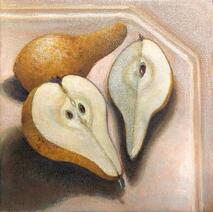 (By Paolo Propato, LAc) The other morning Issa was lost in thought, looking out the window while we sat at the breakfast table. I was drizzling honey on a sliced pear when he turned to me and asked, “Dad, I have a question.” That is typically how every conversation starts with him. “What is wood made out of?” “Trees,” I replied. “Then what are trees made out of?” I felt I knew where he was going so I smiled and said, “Wood.” “WHAT?! That makes no sense. How can wood make a tree and the tree make wood?!” |
AuthorWrite something about yourself. No need to be fancy, just an overview. Archives
April 2024
Categories |
 RSS Feed
RSS Feed